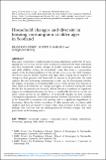Files in this item
Household changes and diversity in housing consumption at older ages in Scotland
Item metadata
| dc.contributor.author | Fiori, Francesca | |
| dc.contributor.author | Graham, Elspeth | |
| dc.contributor.author | Feng, Zhiqiang | |
| dc.date.accessioned | 2017-09-13T12:30:09Z | |
| dc.date.available | 2017-09-13T12:30:09Z | |
| dc.date.issued | 2019-01 | |
| dc.identifier | 250565993 | |
| dc.identifier | d2c13252-4f96-4e28-9f88-f12b7d9ba6ea | |
| dc.identifier | 85057584856 | |
| dc.identifier | 000452002400007 | |
| dc.identifier.citation | Fiori , F , Graham , E & Feng , Z 2019 , ' Household changes and diversity in housing consumption at older ages in Scotland ' , Ageing & Society , vol. 39 , no. 1 , pp. 161-193 . https://doi.org/10.1017/S0144686X17000873 | en |
| dc.identifier.issn | 0144-686X | |
| dc.identifier.uri | https://hdl.handle.net/10023/11651 | |
| dc.description | This research was funded by ESRC Secondary Data Analysis Initiative, Grant number ES/K003747/1. | en |
| dc.description.abstract | This paper contributes to understanding housing adjustments in later life by investigating the role of four key lifecourse transitions experienced by older individuals and their households, namely changes in health, retirement, union transitions and adult children leaving the household. Using data from a representative sample of the Scottish population for the decade 2001–2011, the study examines who moves and, for movers, whether they adjust their housing size in response to changes in their personal and household circumstances. In particular, the study explores diversity in housing consumption at older ages by investigating whether the triggers of upsizing or downsizing differ across tenure groups. The majority of older adults in Scotland do not change their place of residence during the study decade. For the minority who do move, all four lifecourse transitions are significant triggers for residential relocation but there is considerable diversity across the two major tenure groups in the influence of household changes on their housing consumption adjustments. In both tenure groups, however, the presence of children in the household is associated with upsizing and is a significant impediment to downsizing. Given the relative rootedness of older parents with co-resident adult children and their propensity to upsize rather than downsize if they move, our findings raise concerns over the interdependencies between younger and older generations in the housing market. | |
| dc.format.extent | 33 | |
| dc.format.extent | 261053 | |
| dc.language.iso | eng | |
| dc.relation.ispartof | Ageing & Society | en |
| dc.subject | Household changes | en |
| dc.subject | Residential moves | en |
| dc.subject | Housing adjustments | en |
| dc.subject | Downsizing | en |
| dc.subject | Upsizing | en |
| dc.subject | Older adults | en |
| dc.subject | Scotland | en |
| dc.subject | GF Human ecology. Anthropogeography | en |
| dc.subject | H Social Sciences | en |
| dc.subject | 3rd-DAS | en |
| dc.subject.lcc | GF | en |
| dc.subject.lcc | H | en |
| dc.title | Household changes and diversity in housing consumption at older ages in Scotland | en |
| dc.type | Journal article | en |
| dc.contributor.sponsor | Economic & Social Research Council | en |
| dc.contributor.institution | University of St Andrews. School of Geography & Sustainable Development | en |
| dc.identifier.doi | 10.1017/S0144686X17000873 | |
| dc.description.status | Peer reviewed | en |
| dc.identifier.grantnumber | ES/K003747/1 | en |
This item appears in the following Collection(s)
Items in the St Andrews Research Repository are protected by copyright, with all rights reserved, unless otherwise indicated.

